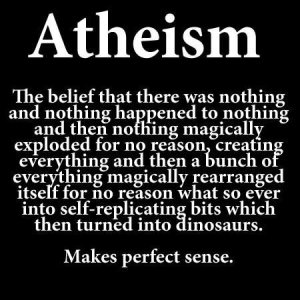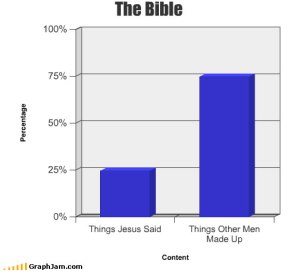 Some Christians seem fond of declaring, “I don’t have enough faith to be an atheist.” That’s a pretty stupid thing to say if you’re someone whose religion is based on faith. It’s also a pretty stupid thing to say to someone who’s actually an atheist, rather than a fellow Christian who’ll smile and nod “knowingly” without bothering to think about it.
Some Christians seem fond of declaring, “I don’t have enough faith to be an atheist.” That’s a pretty stupid thing to say if you’re someone whose religion is based on faith. It’s also a pretty stupid thing to say to someone who’s actually an atheist, rather than a fellow Christian who’ll smile and nod “knowingly” without bothering to think about it.
One thing that’s stupid about it is that it denigrates faith. Even for an atheist like me, that seems wrong. Faith is a powerful thing. Even in a world devoid of deities, we have faith in other people. I know what it’s like to have faith in someone. I know what it’s like to have that faith rewarded. I know what it’s like to have that faith betrayed. And (as a former born-again Christian) I know what it’s like to have faith that’s neither rewarded nor betrayed, but still abides nonetheless. It’s not a trivial thing.
One reason Christians pursue the “atheist faith” line of reasoning (or perhaps I should say “reasoning”) is because it’s a way to equate atheism with religion. This has tactical advantages — for instance, if there’s some public school curriculum you don’t like (e.g. evolution), you can declare that it’s atheist in nature (even if it’s not), and try to have it banned because it’s religious (since atheism is a religion, right?).
But while there are a few activist Christians pursuing such blatantly tactical approaches, most of them are just talking about and thinking about stuff. So why the denigration of faith? Why try to undermine the mainstay of their own religious view?
 Maybe it’s because they think they can win on an appeal to what “makes perfect sense,” either literally or sarcastically. Maybe that’s the whole reason they’re theists in the first place — they simply can’t believe that nobody’s in charge, and their religious belief isn’t really based on faith in the first place, but on a need to feel certain about something, even if what they feel certain about is absurd. For some people, answering a question like “How did the universe come about?” by saying “It’s magic” is more satisfying than saying “I don’t know.”
Maybe it’s because they think they can win on an appeal to what “makes perfect sense,” either literally or sarcastically. Maybe that’s the whole reason they’re theists in the first place — they simply can’t believe that nobody’s in charge, and their religious belief isn’t really based on faith in the first place, but on a need to feel certain about something, even if what they feel certain about is absurd. For some people, answering a question like “How did the universe come about?” by saying “It’s magic” is more satisfying than saying “I don’t know.”
But in a straight-up debate about cosmological-type issues, “I don’t know” wins every time, especially when you can pin down the Christian about specific details of what they claim to “know” (or at least have faith in).
For one thing, there’s the sheer vast emptiness of most of the universe. Creationists like to claim the universe is “fine-tuned” for life, but so far we only know of one planet that has life, and that planet is a tiny portion of its own solar system, which in turn is a really tiny portion of its galaxy, which in turn is only a tiny part of the universe. What’s the deal with creating this whole vast universe just to do a little social experiment on one tiny blue ball in one tiny corner of it?
And then there’s the actual creation story in Genesis. Not only do the first 2 chapters contradict each other (not my favorite Bible contradiction, but a good one), but the second chapter makes God into a colossal cosmic Homer Simpson character, making huge blunders and then cobbling together half-assed kludges to compensate for his mistakes.
For starters, he creates the earth and puts plants on it, but there’s no one to till the soil (BTW, most plants on earth grow in the wild without any tilling needed). So he creates a man (scoops up some mud, shapes it into a man and breathes life into its nostrils), but — D’oh! — the man is all alone! That’s not good. So God decides to create a mate for the man. How does he do this? By creating animals. He creates every animal in the world (same process, breathing life into the nostrils of mud sculptures), and brings them to Adam to name them.
(Question for creationists: There are at least 250,000 species of beetle we know about so far — how much time did Adam spend just naming beetles? If he did it really quickly — say, one beetle per second — that’s still 3 solid days, without pausing to eat, drink, sleep or anything else, just naming beetles. And how many beetles did Adam go through before saying, “Hey, God, I think maybe you’re on the wrong track with these critters. You’ve brought me 185,394 of them already, and I’m pretty sure they’re not getting any closer to being a suitable mate”?)
So God ends up creating every single animal on earth, but — D’oh! — Adam still doesn’t have a mate! So then God (finally!) abandons the whole mud-sculpture concept, and takes a rib out of Adam and makes another person out of that. You’d think, being all-knowing and all, he might have foreseen that the mud-sculpture method wouldn’t work, wouldn’t you? And even if he didn’t foresee that, you might think he’d figure it out fairly early on — maybe around the 497th beetle or so.
Now, if a Christian challenges you to explain how all this stuff got here, you might think “I don’t know” is a lousy answer. But you don’t need to know how it got here to know that it’s here. You can observe that the universe exists, that the earth exists, that life on earth exists, without having any idea whatsoever how it got here. Saying that reality exists isn’t faith, it’s just observation.
But the Christian can’t just rest on “I don’t know” for explaining why (or how) God exists, or any other tenet of his religion — he can’t fall back on saying “I don’t know how God got here, I merely observe that he is here.” Because that’s not an observation — that’s faith.
And, I suspect, that’s why Christians want to claim atheism is also a faith — because it’s the only way they can even begin to attempt to make our worldview appear as comically absurd as their own.
(Christianity cartoon via Migrations; atheism cartoon via The Web Elf Report)
 Assuming Jesus of Nazareth really existed (and I have no problem with the notion that he did), there’s still no record of what he looked like, or what his mom looked like. Maybe he had a beard and long hair, maybe not. Maybe his mom went around in a head shawl, maybe she didn’t.
Assuming Jesus of Nazareth really existed (and I have no problem with the notion that he did), there’s still no record of what he looked like, or what his mom looked like. Maybe he had a beard and long hair, maybe not. Maybe his mom went around in a head shawl, maybe she didn’t. There’s a bumpersticker that says, “If we’re not supposed to eat animals, why are they made out of meat?” That’s funny, in a question-begging* sort of way, but there’s a similar question that needs to be asked of Judeo-Christian-Muslim worldview: If we’re not supposed to eat pigs, why are they made out of bacon?
There’s a bumpersticker that says, “If we’re not supposed to eat animals, why are they made out of meat?” That’s funny, in a question-begging* sort of way, but there’s a similar question that needs to be asked of Judeo-Christian-Muslim worldview: If we’re not supposed to eat pigs, why are they made out of bacon? Some Christians seem fond of declaring, “I don’t have enough faith to be an atheist.” That’s a pretty stupid thing to say if you’re someone whose religion is based on faith. It’s also a pretty stupid thing to say to someone who’s actually an atheist, rather than a fellow Christian who’ll smile and nod “knowingly” without bothering to think about it.
Some Christians seem fond of declaring, “I don’t have enough faith to be an atheist.” That’s a pretty stupid thing to say if you’re someone whose religion is based on faith. It’s also a pretty stupid thing to say to someone who’s actually an atheist, rather than a fellow Christian who’ll smile and nod “knowingly” without bothering to think about it. Maybe it’s because they think they can win on an appeal to what “makes perfect sense,” either literally or sarcastically. Maybe that’s the whole reason they’re theists in the first place — they simply can’t believe that nobody’s in charge, and their religious belief isn’t really based on faith in the first place, but on a need to feel certain about something, even if what they feel certain about is absurd. For some people, answering a question like “How did the universe come about?” by saying “It’s magic” is more satisfying than saying “I don’t know.”
Maybe it’s because they think they can win on an appeal to what “makes perfect sense,” either literally or sarcastically. Maybe that’s the whole reason they’re theists in the first place — they simply can’t believe that nobody’s in charge, and their religious belief isn’t really based on faith in the first place, but on a need to feel certain about something, even if what they feel certain about is absurd. For some people, answering a question like “How did the universe come about?” by saying “It’s magic” is more satisfying than saying “I don’t know.” I already had
I already had Some atheists love to stump Christians (particularly fundamentalists) with the question, “How did Judas die?” This is a pretty good one, since the Bible contains 2 completely different accounts.
Some atheists love to stump Christians (particularly fundamentalists) with the question, “How did Judas die?” This is a pretty good one, since the Bible contains 2 completely different accounts. I’ve been doing this blog for a couple weeks now, and one thing I’ve learned is that talking about being polite is, well … boring. I’m thinking it might be interesting to liven things up a bit by leaving the area of politeness occasionally, and talk about ways atheists can engage with the world without worrying about ruffling feathers.
I’ve been doing this blog for a couple weeks now, and one thing I’ve learned is that talking about being polite is, well … boring. I’m thinking it might be interesting to liven things up a bit by leaving the area of politeness occasionally, and talk about ways atheists can engage with the world without worrying about ruffling feathers.